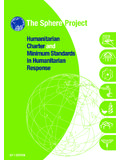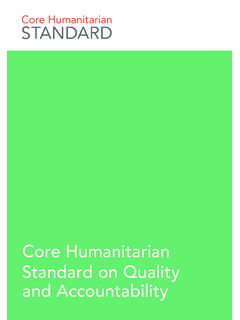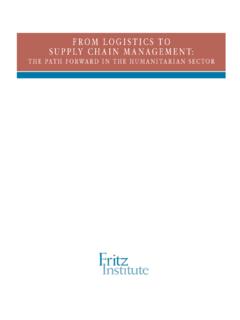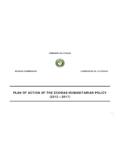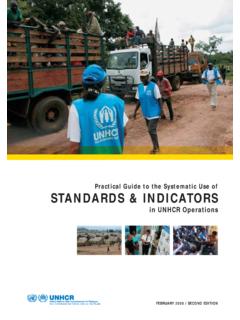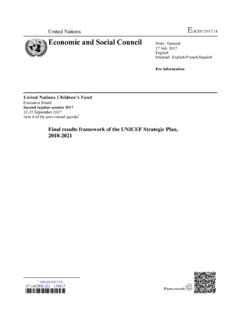Transcription of The Humanitarian Charter - Sphere Handbook
1 The Humanitarian Charter Humanitarian Charter and Minimum Standards in Humanitarian Response The Humanitarian Charter provides the ethical and legal backdrop to the Protection Principles and the Core Standards and minimum standards that follow in the Handbook . It is in part a statement of established legal rights and obligations; in part a statement of shared belief. In terms of legal rights and obligations, it summarises the core legal principles that have most bearing on the welfare of those affected by disaster or conflict. With regard to shared belief, it attempts to capture a consensus among humani- tarian agencies as to the principles which should govern the response to disaster or conflict, including the roles and responsibilities of the various actors involved.
2 It forms the basis of a commitment by Humanitarian agencies that endorse Sphere and an invitation to all those who engage in Humanitarian action to adopt the same principles. The Humanitarian Charter Our beliefs 1. The Humanitarian Charter expresses our shared conviction as Humanitarian agencies that all people affected by disaster or conflict have a right to receive protec- tion and assistance to ensure the basic conditions for life with dignity. We believe that the principles described in this Humanitarian Charter are universal, applying to all those affected by disaster or conflict wherever they may be, and to all those who seek to assist them or provide for their security. These principles are reflected in international law, but derive their force ultimately from the fundamental moral principle of humanity: that all human beings are born free and equal in dignity and rights.
3 Based on this principle, we affirm the primacy of the Humanitarian imper- ative: that action should be taken to prevent or alleviate human suffering arising out of disaster or conflict, and that nothing should override this principle. As local, national and international Humanitarian agencies, we commit to promoting and adhering to the principles in this Charter and to meeting minimum standards in our efforts to assist and protect those affected. We invite all those who engage in Humanitarian activities, including governmental and private sector actors, to endorse the common principles, rights and duties set out below as a statement of shared Humanitarian belief. Our role 2. We acknowledge that it is firstly through their own efforts, and through the support of community and local institutions, that the basic needs of people 20.
4 The Humanitarian Charter affected by disaster or conflict are met. We recognise the primary role and respon- sibility of the affected state to provide timely assistance to those affected, to ensure people's protection and security and to provide support for their recovery. We believe that a combination of official and voluntary action is crucial to effective prevention and response, and in this regard National Societies of the Red Cross and Red Crescent Movement and other civil society actors have an essential role to play in supporting public authorities. Where national capacity is insufficient, we affirm the role of the wider international community, including governmental donors and regional organisations, in assisting states to fulfil their responsibilities. We recognise and support the special roles played by the mandated agencies of the United Nations and the International Committee of the Red Cross.
5 3. As Humanitarian agencies, we interpret our role in relation to the needs and capacities of affected populations and the responsibilities of their governments or controlling powers. Our role in providing assistance reflects the reality that those with primary responsibility are not always fully able to perform this role them- selves, or may be unwilling to do so. As far as possible, consistent with meeting the Humanitarian imperative and other principles set out in this Charter , we will support the efforts of the relevant authorities to protect and assist those affected. We call upon all state and non-state actors to respect the impartial, independent and non-partisan role of Humanitarian agencies and to facilitate their work by removing unnecessary legal and practical barriers, providing for their safety and allowing them timely and consistent access to affected populations.
6 Common principles, rights and duties 4. We offer our services as Humanitarian agencies on the basis of the principle of humanity and the Humanitarian imperative, recognising the rights of all people affected by disaster or conflict women and men, boys and girls. These include the rights to protection and assistance reflected in the provisions of international Humanitarian law, human rights and refugee law. For the purposes of this Charter , we summarise these rights as follows: the right to life with dignity the right to receive Humanitarian assistance the right to protection and security. While these rights are not formulated in such terms in international law, they encapsulate a range of established legal rights and give fuller substance to the Humanitarian imperative.
7 21. Humanitarian Charter and Minimum Standards in Humanitarian Response 5. The right to life with dignity is reflected in the provisions of international law, and specifically the human rights measures concerning the right to life, to an adequate standard of living and to freedom from torture or cruel, inhuman or degrading treatment or punishment. The right to life entails the duty to preserve life where it is threatened. Implicit in this is the duty not to withhold or frustrate the provision of life-saving assistance. Dignity entails more than physical well-being;. it demands respect for the whole person, including the values and beliefs of indi- viduals and affected communities, and respect for their human rights, including liberty, freedom of conscience and religious observance.
8 6. The right to receive Humanitarian assistance is a necessary element of the right to life with dignity. This encompasses the right to an adequate standard of living, including adequate food, water, clothing, shelter and the requirements for good health, which are expressly guaranteed in international law. The Sphere Core Standards and minimum standards reflect these rights and give prac- tical expression to them, specifically in relation to the provision of assistance to those affected by disaster or conflict. Where the state or non-state actors are not providing such assistance themselves, we believe they must allow others to help do so. Any such assistance must be provided according to the principle of impartiality, which requires that it be provided solely on the basis of need and in proportion to need.
9 This reflects the wider principle of non-discrimination: that no one should be discriminated against on any grounds of status, including age, gender, race, colour, ethnicity, sexual orientation, language, religion, disability, health status, political or other opinion, national or social origin. 7. The right to protection and security is rooted in the provisions of inter- national law, in resolutions of the United Nations and other intergovernmental organisations, and in the sovereign responsibility of states to protect all those within their jurisdiction. The safety and security of people in situations of disaster or conflict are of particular Humanitarian concern, including the protection of refugees and internally displaced persons. As the law recognises, some people may be particularly vulnerable to abuse and adverse discrimination due to their status such as age, gender or race, and may require special measures of protec- tion and assistance.
10 To the extent that a state lacks the capacity to protect people in these circumstances, we believe it must seek international assistance to do so. The law relating to the protection of civilians and displaced people demands particular attention here: (i) During armed conflict as defined in international Humanitarian law, specific legal provision is made for protection and assistance to be given to those not engaged in the conflict. In particular, the 1949 Geneva Conventions and the Additional Protocols of 1977 impose obligations on the parties 22. The Humanitarian Charter to both international and non-international armed conflicts. We stress the general immunity of the civilian population from attack and reprisals, and in particular the importance of the principle of distinction between civilians and combatants, and between civilian objects and military objectives; the principles of proportionality in the use of force and precaution in attack.






